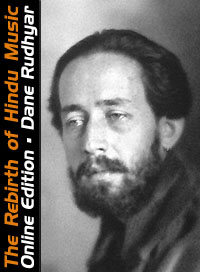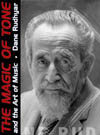 |
| Home | Bio | Art | Music | Literature | Civilization & Culture | Philosophy of Wholeness | Theosophy & Spirituality | Astrology |

THE REBIRTH OF HINDU MUSIC
CONTENTS
Foreword to the Second Edition 1. The Age of Purification 2. Living Tones or Intellectual Notes? 3. Seeds of Sound 4. Descending and Ascending Music 5. The Geometry of Music 6. Melodies and Symphonies 7. Music and Civilization |

Foreword to the Second Edition
The Rebirth of Hindu Music was written in July, 1926, while I was temporarily living in Bryn Mawr, Pennsylvania. It followed by a year the writing of a much longer volume, The Rediscovery of Music, which has remained unpublished. For several years before writing these books, I had been studying what was then available of Oriental music and especially books dealing with it — particularly a few excellent works by French musicologists and historians. A remarkable performer of Hindu music and dance, Ragini Devi, the wife of a highly cultured Indian, Mr. Bajpai, urged me to write down what we had been discussing while I was in New York during the winter of 1925 and 1926, and I acceeded to her wish. The book was published in 1928 by the Theosophical Publishing House in Adyar, Madras, India, in both hardcover and paperback editions. The book was never adequately distributed in America; for at the time only a very few people had any interest at all in oriental music, which most musicians considered 'primitive' and not worth studying. The tide began to turn when the composer Henry Eichheim traveled to Japan, Java and Bali, and on his return interested Leopold Stowkowski, who accompanied him on a trip to these countries — but not to India.
My first contact with Hindu music had been in Paris, early in 1914, when I met a young French composer, Delage, who had traveled to India and written a few lovely songs based on his remembrances of the vocal and instrumental music that had fascinated him. About six years later, my deep interest in the philosophies of India and in Theosophy enabled me to see in what I had read concerning Hindu music and culture a vibrant manifestation of the metaphysical and occult concepts which had fired my youthful mind. In writing The Rebirth of Hindu Music, I had hoped to have at least some slight influence among Indian musicians having some familiarity with the West. I had known Coomaraswamy, the well-known author of The Dance of Shiva and, I believe, the director of the Oriental department in a Boston museum, and he had mentioned the harm done to Hindu music by the increasing use of French-made harmoniums tuned to our Western tonal system. Having been born in Paris, I felt a kind of 'karmic' pressure urging me to try to lead Hindu musicians to a deeper understanding of the philosophical and occult basis of the music they played — a basis which, I was told, they had forgotten. In 1925, I tried to get a scholarship to go to India in order to study the different musical systems of that vast country which, at that time, was not yet freed from British imperialism. But such a project was judged too 'far-out' by the academic committees in charge of dispensing grants. Fifty year later, we have witnessed the exodus of many young Europeans and Americans to India in the hope of finding in that ancient land what neither academic intellectualism nor the materialistic and automated business-world could offer. The spread of phonograph records (there were hardly any of Asiatic music when I wrote this book) has allowed an increasing number of persons to gain at least a superficial acquaintance with non-European music; and music schools and universities have gradually begun to feature studies of Oriental music. The Hippie generation discovered yoga, meditation and Ravi Shankar — as well as psychedelics, which fostered subjective experiences that made them even more susceptible to the equally subjective moods and feelings radiating from Hindu music. This new edition of The Rebirth of Hindu Music is identical to the original one. It would have been impossible for me to modify some paragraphs without changing the whole book. Fifty years make a great deal of difference in the thinking and the style of a writer. My view of Western music, and particularly of what has happened in the field of American music since 1930, has undergone some transformation — or rather it has become tempered by the passage of time and by often frustrating experiences in my contacts with other composers, conductors and pianists. The musical situation has changed greatly during the last forty years, especially after World War II; and what I dreamed of as the ''Syntonic Revolution" has taken quite unexpected forms. Electronic and computer music are introducing new possibilities, but only at the technical level so far. If there really is a 'revolution,' it is spreading slowly, and it still does not operate in terms of the deeper, philosophical aspects of tone and music to which I had attempted to draw musicians' attention. It may be that the new edition of this book, and some other writings I am undertaking, will find more receptive minds. Some of the 'seed-ideas' that are being sown will, I believe, sooner or later germinate among the men and women who are not only dreaming of a New Age, but taking definitive transformative steps toward the "regeneration of the individual" I proclaimed as an ineluctable necessity in the last paragraph of this book. When one is young, one tends to live in a subjective world of consciousness and to follow with enthusiasm paths that too often return to their starting points, because one lacks objectivity and impersonal understanding. As I write these introductory notes, I am about to meet my 84th birthday; I am still very busy working on new books and composing music. My basic vision of the future has not been altered; the world has changed, yet it is still very much the same, except that both the processes of disintegration and potential rebirth have moved closer to what seems to be an unavoidable crisis. In 1925, I felt certain a new world war would come. Now I cannot be so youthfully sure of anything — particularly of what will happen to music all over the world. Philosophers do not cause things to happen, but it should be their task to throw the light of meaning upon what is taking place. Lately, after a couple of centuries of unrestrained and often catastrophic adventures in science and technology, we are witnessing, the rise of 'philosophers of science.' It may be that after many and confusing revolutionary changes in the world of music, philosophers of music may come to see, (beyond the professionalism and commercialism of so much that today passes for music,) the foundations on which all music depends for vitality and spiritual effectiveness. If my work on music and culture has contributed to the emergence of such a philosophy of music — music in both its concrete and its archetypal aspects — I shall consider my repeated attempts not to have been in vain.
Palo Alto, California
November 3, 1978  Web design and all data, text and graphics appearing on this site are protected by US and International Copyright and are not to be reproduced, distributed, circulated, offered for sale, or given away, in any form, by any means, electronic or conventional. See Notices for full copyright statement and conditions of use. Web design copyright © 2000-2004 by Michael R. Meyer. All Rights Reserved. |
 |
